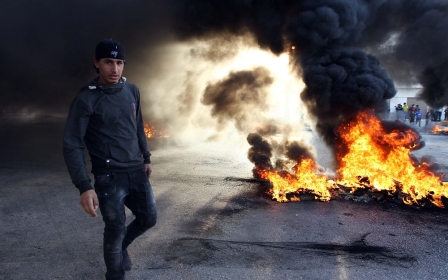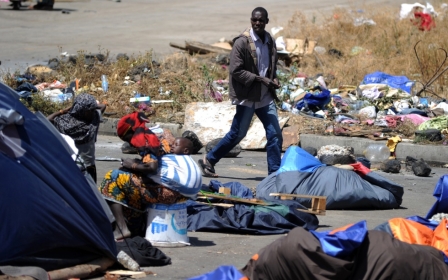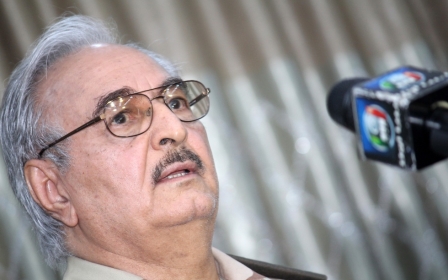ANALYSIS: UN optimistic about Libya peace talks despite fighting

United Nations (UN) officials say they are optimistic that peace talks will begin shortly to end Libya’s civil war, now into its sixth month.
Despite unprecedented levels of violence, with a major battle underway for control of the country’s largest oil port, UN Special Representative in Libya Bernadino Leon says the first round of talks will begin “soon.”
Leon will report the news to the UN Security Council in New York on Monday, where he is due to give an update of his mediation efforts.
In a statement, the UN said it is “encouraged by the positive response to its invitation for a UN-convened Libyan political dialogue. The move by the parties to identify their respective delegations to the talks is a step in the right direction.”
Leon originally told NATO foreign ministers in Brussels at the start of the month that he would hold peace talks on 9 December. A day before they were due to start, he announced a postponement until “the beginning of next week.”
That second deadline has now also passed, but Leon insists talks are now almost ready, while not yet committing to a date.
Both rival governments to attend talks
Leon will tell UN chiefs his optimism is because Libya’s internationally recognized parliament in Tobruk has joined its rival Tripoli government in naming representatives to attend those talks.
Leon says the talks will also include militia chiefs, excluding Ansar al Sharia, the Benghazi-based militia blacklisted as a terrorist organization by the UN. ”The rest of the armed groups should be involved, should be part of this dialogue,” he told a press conference in Tripoli on 8 December.
Despite Leon’s optimism, the task of ending fighting that has cost more than 1,000 lives and left 400,000 homeless remains formidable.
Libya now has two separate governments, each controlling its own armed forces, based at opposite ends of the country.
The internationally recognized government, the House of Representatives (HOR), moved to the eastern town of Tobruk after fighting began in Tripoli in July, a month after being installed by UN-supervised elections in June.
Libya’s former parliament, the General National Congress (GNC), has re-convened in the capital, representing what it says are the “revolutionaries” who overthrew Muammar Gaddafi in the 2011 revolution.
Leon’s first problem is getting the two sides to sit down at the same table, with each government refusing to recognize its rival.
The GNC insists it is the only legitimate government, after a Supreme Court ruling in November declared the law for the June elections invalid, and by implication the HOR also invalid.
The HOR refuses to recognize the court ruling, saying the court, based in Tripoli, was under duress from militias, and insists that, having gained international recognition from the UN itself, it is Libya’s only government.
Leon has attempted to address the competing claims by saying both sides can sit at the table without the need for either to recognize the other.
Militia leaders to attend the UN talks
The UN’s bigger problem is deciding which armed groups to invite. Formally, both governments have announced that their forces fight until the banner of National Army, so in theory Leon could restrict invitations to the chiefs of the two national armies.
In practice, both armies are collections of militias, whose leaders will need to sign onto any peace plan for it to work.
For Tobruk, the most noted commander is Khalifa Haftar, a general brought out of retirement and to lead forces against Ansar al Sharia units in Benghazi. In western Libya, pro-Tobruk Zintan militias are fighting GNC forces under separate commanders, who will also need to be invited.
In Tripoli, Libya Dawn is the key fighting formation, itself a collection of militias from the towns of Misrata, Zawiya, Sabratha and Zuwara, along with some Tripoli-based formations. Their commanders might also want to be represented, most notably Sala Badhi, commander of units from Misrata, home to Libya’s most powerful militias.
If all the politicians and commanders can be persuaded to sit at the table, the next problem will be agreeing a deal.
Outlines of a possible UN peace plan
Leon outlined some of what he hopes to achieve in an interview with the Spanish El Pais newspaper in November. His plan begins with a comprehensive ceasefire, matched with agreement that all armed forces will leave the cities.
That would be followed by all sides agreeing on a “unity government.” This would govern until a new constitution, being designed by a commission elected in February, is ready.
If the constitution is approved by referendum, itself only possible with an end to the war, new elections could be held early next year and diplomats say Libya could then press the “reset” button.
Some diplomats have mooted the idea of the constitutional commission taking over as legislative arm of the unity government, but such a move exceeds its powers and would likely collapse under legal challenge in the Supreme Court.
But even the idea of a ceasefire is politically charged, because Tobruk supporters say it would freeze the current front lines, allowing the GNC to keep control of Tripoli. Leon insists the militia withdrawals would mean neither government controls any of the cities, but this pre-supposes that a neutral force is able to impose security.
Libya has no such “third force”, acceptable to all sides, leaving the option of deploying international peacekeepers.
In 2011 NATO provided bombing support, but not ground troops, to help rebels prevail against Gaddafi, and some nations might agree to help again. So far only Italy has indicated willingness to send peacekeepers, while insisting other nations must first also commit.
The Battle of Es Sidre
Perhaps the greatest obstacle to the UN talks is the war itself.
Last week Tobruk’s Prime Minister, Abdulla al Thinni, announced Libya’s oil revenues, almost the country’s only source of income, would no longer be paid to the Central Bank, after complaints that the bank, located in Tripoli, was sympathetic to the GNC.
The bank insists it is independent, but Thinni’s move appears likely to stick. As long as the UN continues to recognize the Tobruk parliament, the HOR is entitled to the oil revenues.
GNC officials worry the move will starve them of funds, while allowing the HOR to continue building its own forces, notably its expanding air force which opponents claim is being supplied by Egypt.
In apparent response, the GNC launched its most ambitious offensive of the war, an operation to drive more than a hundred miles east from bases in Sirte and seize Es Sidre, Libya’s largest oil port, and nearby Ras Lanuf, its largest refinery.
The GNC knows that, while the recognition status remains the same, it is unable to sell oil under its controls on the world market. But it also knows that control of key oil ports will allow it to decide how much oil is sold, and perhaps leverage an agreement that in return for allowing exports, it will get a proportion of the proceeds.
The offensive began on Saturday and made rapid progress, with 300 vehicles carrying troops, mostly from Misrata, getting to the gates of Es Sidra on that first day.
But there the offensive stopped, with Libya’s Tobruk-controlled air force launching waves of bombing strikes to pound front-line units and rear-area positions around the town of Bin Jawad.
In the following days, the frontline expanded south, with battles raging further into the desert close to several oil fields. Casualty lists remain unclear, but both sides are aware that this is a battle they cannot afford to lose, with control of the oil likely to settle the course of the war - unless peace talks can short circuit the fighting.
On Wednesday the GNC announced it was pulling back a few kilometres from Es Sidre, saying it feared the port would otherwise be damaged by the fighting, but insisted reinforcements were being sent.
Tobruk sources are equally optimistic, with one air force commander labeling the GNC attack “suicidal” because the advancing troops are in the open in the desert, and acutely vulnerable to continuing air strikes.
Central Bank says funds running dry
On one thing, though, the UN already has agreement from all sides, and that is that time is running out.
Last week the Central Bank announced a gaping hole in state finances, with income of $19 billion for this year failing to meet outgoings of $38 billion, most of it in salaries and pensions. For the moment, the bank is making good the shortfall with foreign reserves, but no-one seems clear on when these will run out - leaving most Libyans without an income.
Leon nevertheless remains upbeat, and will tell UN leaders that, despite conditions on the ground, peace prospects are good. Many Libyan civilians will be hoping he is right.
New MEE newsletter: Jerusalem Dispatch
Sign up to get the latest insights and analysis on Israel-Palestine, alongside Turkey Unpacked and other MEE newsletters
Middle East Eye delivers independent and unrivalled coverage and analysis of the Middle East, North Africa and beyond. To learn more about republishing this content and the associated fees, please fill out this form. More about MEE can be found here.




